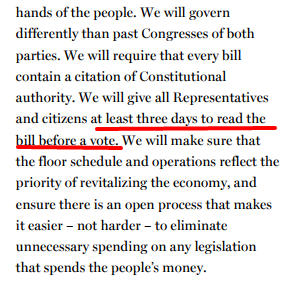
Source: MasonDan
Update at 12:52 pm on Tuesday: After an outpouring of phone calls, emails, tweets and an avalanche of news stories, House Republicans held a secret meeting just before noon and pulled the Goodlatte amendment, which would have eviscerated the Office of Congressional Ethics. While we have won for now, members are quoted as saying they’re going to revisit the issue later this year. We must remain vigilant.
Update at 10:05 am Tuesday: We are trying to find out which members voted to gut OCE. YOU CAN HELP. Follow this link and let us know who voted to undermine OCE.
Update at 7:22 pm: House Republicans, in a secret meeting of their conference, voted 119–74 to undermine the Office of Congressional Ethics, the House’s independent ethics watchdog, by subsuming it under the Ethics Committee, taking away most of its powers, and undermining its transparency. The vote itself is secret. The amendment will be placed into the House Rules package, to be voted on tomorrow, which inevitably will pass. This is bad news, and we must keep calling on Congress to restore and strengthen OCE. Here is the text of the amendment (credit Eric Lipton).
An effort apparently is afoot today to weaken the House independent ethics watchdog, the Office of Congressional Ethics (OCE), by placing it under the House Ethics Committee. This would undermine the very purpose it is meant to serve.
OCE was created because Congress and the general public viewed the House Ethics Committee as having failed in its duties to police the House of Representatives, resulting in a series of transgressions culminating in the Abramoff corruption scandal and the Foley page sexting scandal. OCE and the Ethics Committee are institutional rivals, with very different roles: OCE investigates bad behavior and adds transparency to the process; the Ethics Committee operates in secret and only it can mete out punishment.
According to reporter Billy House, Rep. Goodlatte is leading the charge to undermine OCE. He tweets:
Proposed Goodlatte amendment to rules package would place the independent Office of Congressional Ethics under oversight of Ethics Committee
— Billy House (@HouseInSession) January 2, 2017
Just recently, a bipartisan coalition of open government and ethics organizations called on the House to re-authorize OCE without weakening its powers. They wrote:
OCE is one of the stellar ethics accomplishments of the House of Representatives…. OCE has helped change a secretive and oft-perceived moribund ethics enforcement process into a reasonably more accountable and active system.
It seems that the amendment is being offered as part of the internal House Republican conference debate on the Rules of the House of Representatives, which is taking place today. House Republicans will present their rules package late tonight or tomorrow, and it will be voted on tomorrow (Tuesday).
In doing so, this also apparently violates the GOP’s Pledge to America, which says that Republicans will “give all Representatives and citizens at least three days to read the bill before a vote.” This pledge has been interpreted as requiring 3 legislative days.

I am having trouble seeing how public release of the proposed House Rules tonight (or tomorrow) will satisfy that 3-legislative-day requirement, but it certainly violates the spirit. Other legislation intended for consideration this upcoming week is already online, which begs the question of why not here?
We are reaching out by twitter to encourage the House to leave OCE as an independent ethics watchdog. Please re-tweet:
The Office of Congressional Ethics is one of the best congressional reforms of the past two decades. Weakening OCE — in particular, placing it under the enervated Ethics Committee — will foster corruption and undermine congressional transparency.
STOP the House’s assault on its ethics watchdog-Tell @SpeakerRyan @GOPLeader@SteveScalise: keep OCE independent! Call your rep 202-224-3121
UPDATE at 5:40pm — Here’s a description of the Goodlatte amendment:
Renames the “Office of Congressional Ethics” the “Office of Congressional Complaint Review,” and places the Office under the oversight of the Committee on Ethics. Provides protections against disclosures to the public or other government entities, and requires that any matter that may involve a violation of criminal law must be referred to the Committee on Ethics. Provides greater certainty as to the commencement and termination of any review, including timely notice to the subject and Committee on Ethics. Bars the consideration of anonymous complaints and requires rules changes to better safeguard the exercise of due process rights of both subject and witness. Limits the jurisdiction of the Office to the last three Congresses to conform to the statute of limitations for the Committee on Ethics.
In other words, it eviscerates OCE.
Update at 7:53: Here is a statement for attribution to Daniel Schuman, Policy Director, Demand Progress
“Today House Republicans made an unfathomable decision to weaken ethics and accountability in the House of Representatives, undoing reforms enacted in the wake of a series of scandals that shook Washington. The House cannot police itself, which is why it created the Office of Congressional Ethics, an independent watchdog with a fact-finding mission that uses transparency to provide accountability for Members of the House and serves as a stimulus to the moribund Ethics Committee.
With today’s action — taken behind closed doors and with no opportunity for public debate — the House now rolls back the clock to an era of corruption and decay. We will all be the worse for it.”
Update on Tuesday at 9:28am: My colleague at CREW Adam Rappaport tweets that over the last two Congresses, OCE has about a 50% ratio of referring matters on to the House Ethics Coommittee.
Journalist Steve Rich tweeted that his article “10 members of Congress took trip secretly funded by foreign government” would not have been possible without the work of OCE.
This story would not have been possible without the Office of Congressional Ethics. https://t.co/T1bDc7RmrE
— Steven Rich (@dataeditor) January 3, 2017
Not only is that true, but OCE’s report showed where the House Ethics Committee failed to do its job and misled members into taking trips and receiving gifts that federal law prohibits.
This backgrounder from Public Citizen makes the case for an independent Office of Congressional Ethics.
— Written by Daniel Schuman
